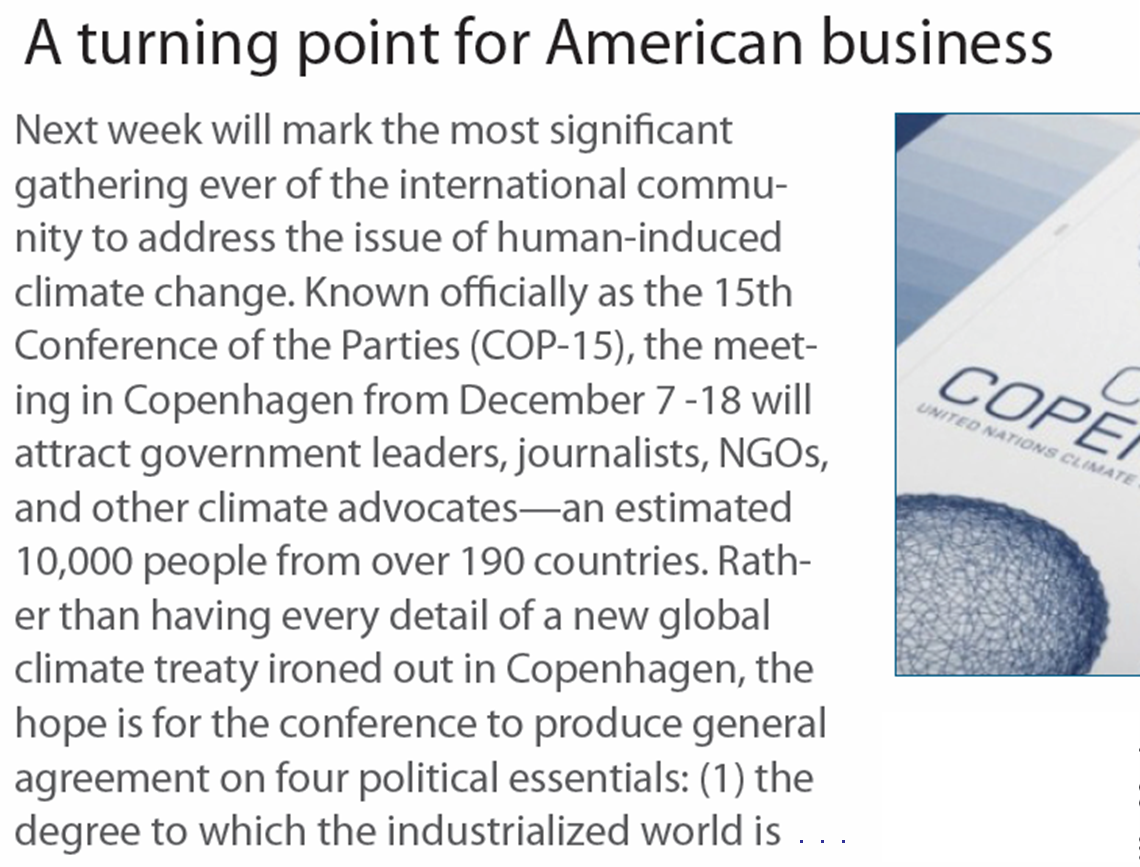This EarthDay April 22, a group of leading global businesses announced the formation of Interraction, a consortium that will advise businesses about the risks of climate change and the advantages of sustainable solutions. carbonRational is among these firms. Here is our launch announcement:
carbonRational announces the launch of InTERRAction - the first multi-disciplinary business consortium established to address climate change risk.
InTERRAction provides a collective 360 degree expertise, and will offer a unique, cross-functional perspective that is necessary to help corporations manage climate related risks and leverage the business opportunities they create. InTERRAction provides businesses with both advisory services as well as execution of its recommendations.
“Corporate sustainability efforts, if they exist at all, are often characterized by ‘silo thinking’,” said Andrew McKeon, co-founder of Interraction, and principal at carbonRational, a strategic consulting firm focusing on addressing climate change at a systems level. “Management may commission a state-of-the-art green building from their facilities department, but then neglect to orchestrate complementary changes in the departments responsible for vendor practices, product sourcing and packaging, site location and corporate development. Typically, the result is that the anticipated payback in terms of environmental impact, return on investment and risk management falls short of goal.”
Mr. McKeon noted that the group’s founding vision is to offer a comprehensive strategic approach based on the collective knowledge and experience of its membership. “As a group, we can help corporations with the difficult task of seeing the organization as a whole, which is the key to delivering sustainable shareholder value and reputation. We are replacing ‘silo thinking’ with ‘systems thinking’.”
As a starting point, Interraction uses a diagnostic tool called The Sustainability Scorecard to assess and manage climate change risk.
“The Scorecard functions like a full body scan in a medical check-up,” said Kenneth D. Makovsky, Co-Founder of the consortium, and president of Makovsky + Company, an independent communications consultancy. He noted that the Scorecard provides a snapshot of the notable risks throughout an organization, pinpointing specifically the impact climate change can have on a firm’s growth and reputation. The findings are summarized in an easy to understand risk index. The Consortium then collaborates with a client’s leadership to review the findings, identify areas of concern, and discuss options to manage any of the risks uncovered.
“Interraction is poised to counsel any business on a single area of functional expertise,” added Mr. Makovsky. “But our true power as an organization lies in our collaboration that can bring into focus the significant environmental risks and opportunities that are typically obscured by departmental myopia.”
“Interraction proposes to deliver a compelling blend of disciplines for an integrated approach to corporate sustainable practices,” commented Aaron Binkley, director of AMB’s Sustainability Programs. AMB is a beta customer of Interraction and is currently assessing the service’s applicability.
Interraction consists of top experts in Architecture, Climate Forecasting, Communications, Environmental Science, Law, Management Consulting and Engineering. Members firms include:
• Arnold & Porter: One of the preeminent law firms in the world, Arnold & Porter offers clients broad expertise in understanding the legal implications of climate change, educating and advising them on their legal status vis à vis current law, and what to expect in coming legislation.
• Buro Happold: A premier international design and engineering firm that is a global leader in balancing sustainable design and functionality, Buro Happold provides expertise in environmental impact statements, environmental management, masterplanning and design, and specialized services.
• carbonRational: A management consultancy focused on corporate strategies for climate change and sustainability based on systems thinking. carbonRational was founded by Andrew McKeon, a former systems engineer and operations specialist who for several years has been working with Al Gore and The Climate Project to raise awareness on climate change.
• FXFOWLE Architects: FXFOWLE enjoys an international recognition for excellence in design and pioneering green architecture, including the Conde Nast Building (the first green skyscraper in New York), the New York Times Headquarters (with Renzo Piano), and LEED projects representing over 12 million square feet.
• Makovsky + Company: One of the largest independent public relations, investor relations and branding consultancies in the USA, Makovsky + Co. has been engaged by corporations ranging from the Fortune 500 to emerging leaders in sustainable products and services, financial and professional services, health, and technology industries.
• Svante Scientific: founded to deliver to the private sector the quantitative information developed at Columbia University and NASA that is needed to identify opportunities and reduce risks associated with the changing global climate. The firm delivers both climate data and custom simulations of future climate change.
For more information about the consortium or The Sustainability Scorecard, please contact carbonRational at 917-750-6779 or info@carbonRational.com.













